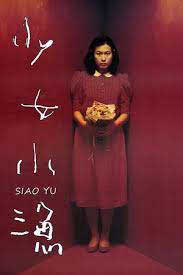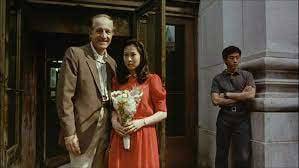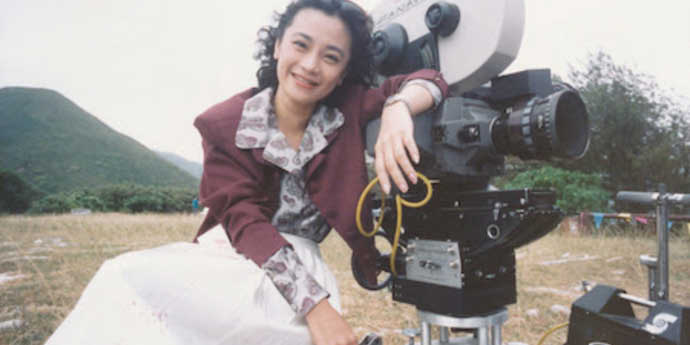
Reviewed by YTSL

For some reason or other, Hong Kong movie directors (notably the Texas university-educated Tsui Hark) -- and others of that entertainment industry’s personnel (including Peter Pau and Christopher Doyle, both of whose Tinseltown efforts have not garnered even half the acclaim that certain of their East Asian output has gotten them) -- haven’t fared all that well whenever they have ventured across the Pacific Ocean to the land known in Cantonese as “Gold Mountain”. Even when their projects do not appear to have been (directly) touched by Hollywood (e.g., with “Hot War” or “A Man Called Hero”), their American sections still can come across as the works’ weakest sections. Nevertheless, as evidenced by Patrick Tam’s “Love Massacre” -- which was largely set in San Francisco -- and Stanley Kwan’s entirely shot-in-the-U.S.A. “Full Moon in New York”, this is not to say that disastrous outcomes are the entirely inevitable result of such often necessarily transcultural exercises.
For the most part, I would add this Sylvia Chang
adaptation of a Yan Geling novel to the select and still rather short list
of successful plus watchable “East in West” efforts (among which are Ang
Lee’s “Pushing Hands” and “The Wedding Banquet”). Granted that SIAO
YU doesn’t get off to the best of starts; so much so, in fact, that I would
go as far as to opine that this “Green Card drama”’s first twenty minutes
looked to be filled with some of the most leaden English dialogue plus ineffectual
acting by “gweilo” actors that I have witnessed in quite a long while.
A good measure of how much better the Sylvia Chang, Yim Geling and James
Schamus co-scripted plus Hsu Li-Kong and Ang Lee co-produced film became
-- and stayed, up until the very moment that it finally drew to a close --
though can be seen by this (re)viewer having been moved to tears at the 1995
work’s conclusion as a result of her having come to care so much for at least
two of its immensely genuine seeming characters.

The unhurried paced -- but never ever boring, because it is so detail rich -- SIAO YU derives its title from the name of a twenty-four year old illegal immigrant (luminously portrayed by a film-debut making, Asia-Pacific Film Festival Best Actress award-winning and popular Taiwanese singer Rene Liu) who had followed her scholarship student-fish market worker boyfriend to New York from (Mainland) China. Early in that which would be more properly considered a Taiwanese than Hong Kong effort (but, in any case, most definitely bears Sylvia Chang’s distinctively sensitive directorial imprint), the actually ambitious beau (Giang Wei is essayed by Tou Chung-Hua) of the movie’s main character gets his girlfriend since childhood -- an individual who had spent some years in an orphanage run by his mother -- involved in a scheme to obtain a Green Card: That precious piece of U.S. government documentation whose acquisition would increase the (until then actually illegal and financially exploited) sweat shop worker’s pay, ensure that she no longer would have to run, hide plus majorly fear whenever INS officials appeared in the vicinity plus effect other freeing -- and near magical -- transformations of her -- and also, it was assumed or at least hoped, his -- socio-economic circumstances.
Briefly put: The particular arrangement that Giang Wei and SIAO YU entered into involved his forking over a supposed bargain amount of $10,000 -- when compared to the more usual $25,000 -- to someone who had found an American man to enter into a “paper marriage” with her. Soon after meeting and wedding Mario Moretti (a down-and-out sometime writer well played by Daniel J. Travanti) in a civil ceremony, this film’s heroine moves out of the small room she had been staying in with Giang Wei into the grotty apartment of the sixty year old stranger who now legally was her husband. Even while -- both inside plus outside of their home space -- they continued to keep their lives largely separate and adhere to the defined patterns of existence they had followed prior to their officially becoming man and wife, they had to do enough to ensure that the powers that be not declare their marriage to be a sham (and send them to jail for their troubles).
In the process, SIAO YU and Mario get to know each other better than either of them probably thought that they ever would (want to). Instead of familiarity breeding contempt, she -- who he described to his true love (The rolling stone-like Rita comes in the form of Marj Dusay) as “a fighter too, though in a way you might not recognize” -- and he -- who she told Giang Wei was “not a bad person to begin with” -- also come to appreciate the personal character, disposition plus habits of their legal other half. Additionally, their lives (even) start to slowly but surely intertwine in more than those superficial ways -- like his cooking dinner for her and her doing his laundry along with that of her own -- that already had caused the only infrequently in town Rita and dubious acting (himself) Giang Wei to feel bothered, jealous plus suspicious about an individual who is of the same gender as but decades apart in age from them.
In the hands of less capable others, this set in New York effort could have been so easily saddled with and ruined by a whole bunch of tired clichés and “racial” stereotypes. However, SIAO YU had someone at its helm who was able to paint an interesting picture; much of whose beauty stems from the principal characters who are in the thick of the depicted proceedings coming across, above everything else, as the kind of people who could easily be envisioned as existing in real -- as opposed to just reel -- life. Consequently, I feel able to happily state with the utmost confidence that Sylvia Chang has done it again: I.e., crafted a personal feeling work that’s positively brimful of entirely three-dimensional humanity.
My rating for this film: 8.
